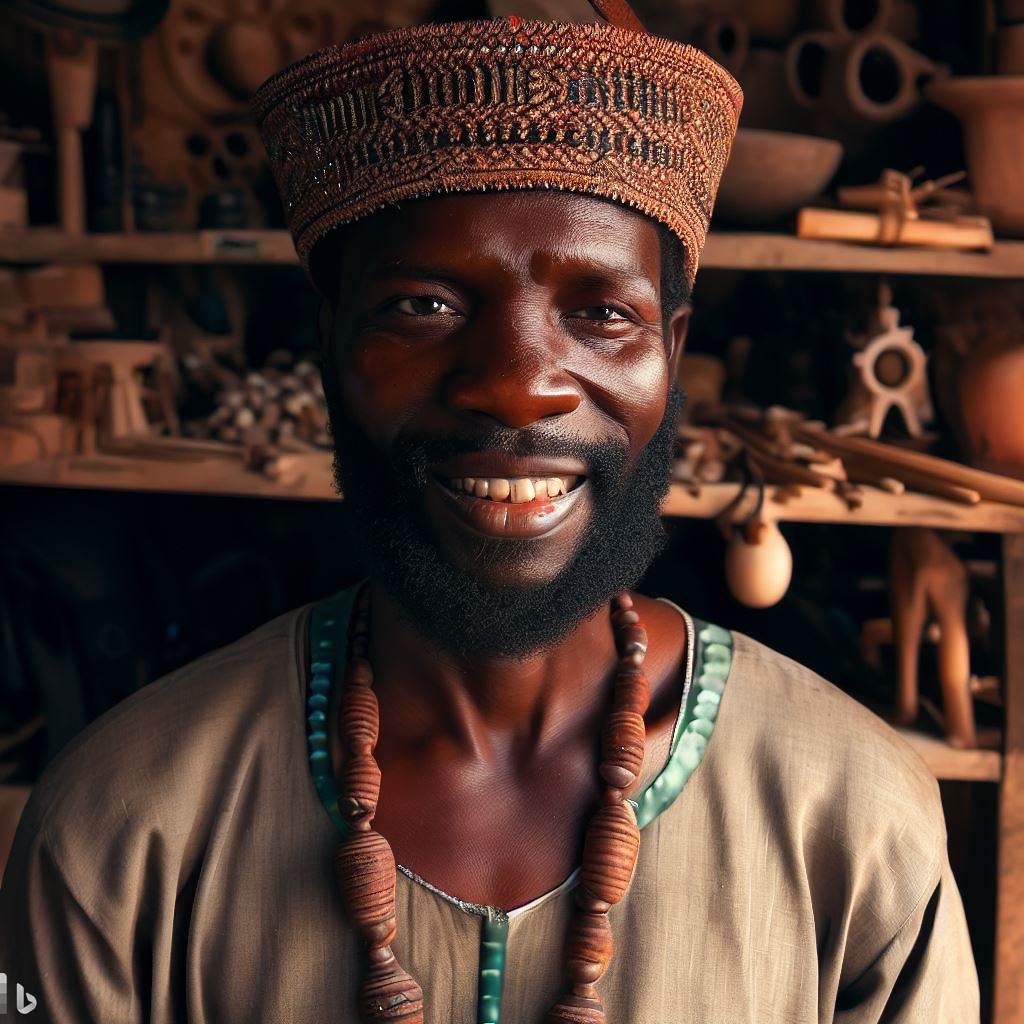Prospects and Challenges: Craftsmanship in Nigeria
Last Updated on August 2, 2023
Introduction
Craftsmanship has always played a significant role in the history and culture of Nigeria. It is an essential part of the country’s heritage and economy.
The quality and uniqueness of Nigerian craftsmanship are admired worldwide, making it a crucial aspect of the country’s heritage.
However, despite the numerous prospects and opportunities that come with Nigerian craftsmanship, there are also several challenges that hinder its growth and development.
This blog section aims to delve into the importance of Nigerian craftsmanship and provide an overview of its prospects and challenges.
Read: Impact of Modern Tech on Traditional Crafts in Nigeria
Prospects of Craftsmanship in Nigeria
- The demand for Nigerian crafts is growing both locally and internationally. This presents an opportunity for skilled craftsmen to showcase their talents and earn a living.
- With the emergence of new markets, there are more opportunities for craftsmen to expand their customer base and increase their earnings.
- The Nigerian government has shown support for the promotion and preservation of craftsmanship. This support includes funding and programs aimed at developing and promoting Nigerian crafts both locally and internationally.
Craftsmanship in Nigeria faces challenges but also holds growth prospects
- Increased demand for Nigerian crafts locally and internationally.
- Emergence of new markets in the tourism industry.
- Government support through funding and programs, including NCAC initiatives.
Craftsmen have opportunities to showcase their talents, attract customers, and preserve Nigerian cultural heritage. The government’s support and recognition of craftsmen’s contributions will boost the sector’s growth.
Prospects include job opportunities, economic growth, and preserving Nigeria’s cultural heritage through craftsmanship.
Read: Preserving Nigerian Craftsmanship: A Call to Action
Challenges of Craftsmanship in Nigeria
Inadequate Infrastructure and Access to Facilities
Craftsmen in Nigeria face challenges related to inadequate access to facilities, infrastructure, and equipment needed for their trade. Access to resources such as electricity, internet connectivity, and transportation can be an obstacle in the production process.
This affects the quality and quantity of products produced and can make it difficult for craftsmen to compete in the market.
Lack of Organized Training and Development Programs
Craftsmen in Nigeria generally lack access to formal training and apprenticeship programs.
This has led to a significant skill gap in the industry, where many craftsmen lack the necessary knowledge and expertise to compete in the global market. There is a crucial need for training programs that provide skills development, technical expertise, and business management knowledge for craftsmen.
Threats Posed by Cheap Imports and Mass-Produced Items
The importation of cheap, mass-produced goods, which are often of lower quality, has posed a severe threat to craftsmen in Nigeria.
This competition has made it challenging for craftsmen to sell their products, even in the local market, and has led to a decline in the value placed on handmade, unique crafts.
Limited Access to Finance for Craftsmen
Craftsmen in Nigeria have often struggled to secure financing for their businesses. Many financial institutions are hesitant to invest in the industry, given its perceived high risk and the lack of formal structures. This limited access to financing can pose a significant obstacle for craftsmen who are trying to grow their businesses and expand their reach.
The challenges facing craftsmen in Nigeria are limited access to infrastructure and facilities, lack of organised training and development programs, threats posed by cheap imports and mass-produced items, and limited access to finance options addressing these challenges require significant commitment from all stakeholders, including the government, private sector, financial institutions, and craftsmen themselves.
A comprehensive approach that takes into account the unique needs and challenges of craftsmen in Nigeria is necessary to promote and sustain the growth of the sector.
By providing access to necessary facilities, training, and finance, Nigerian craftsmen can be overcome the challenges they face and thrive in the global market.
Read: Trade Skills: Empowering Nigeria’s Youth Population

Efforts to Overcome Challenges and Improve Prospects
The craftsmanship industry in Nigeria faces a lot of challenges that hinder its growth and development.
However, various efforts have been put in place over the years to overcome these challenges and improve the prospects of the industry. Some of these efforts include:
Collaborative efforts by craftsmen and government towards infrastructure development
The lack of infrastructure poses a significant challenge to the craftsmanship industry in Nigeria.
Poor road and power networks make it difficult for craftsmen to transport their products and power their work tools.
To overcome this challenge, craftsmen have collaborated with the government to develop the infrastructure necessary for their business operations. This collaboration has led to the construction of roads, bridges, and power stations that provide craftsmen with the necessary infrastructure to grow their businesses.
Private organizations offering training and skill development programs
Another challenge faced by the craftsmanship industry in Nigeria is the lack of skilled manpower. Many artisans lack proper training and skillset needed to produce high-quality products.
To address this challenge, private organizations have stepped in to offer training and skill development programs. These programs equip craftsmen with the necessary skills to produce high-quality products that meet international standards.
By improving the skillset of craftsmen in Nigeria, the industry can produce high-quality goods that can compete globally.
Promotion of quality standards and certifications to trade associations
To succeed in the global marketplace, the craftsmanship industry in Nigeria must meet international quality standards.
However, most craftsmen in Nigeria are not aware of these standards or how to meet them.
To overcome this challenge, trade associations have been established to provide craftsmen with access to information on international quality standards. These associations also offer certification programs that help craftsmen meet these standards and improve the quality of their products.
Encouragement of foreign investment in the craftsmanship sector
The Nigerian government has also been encouraging foreign investment in the craftsmanship sector.
This has led to increased foreign investment in the industry, enabling craftsmen to access new markets and technological advancements. This foreign investment has also led to increased production capacity, enabling craftsmen to meet the demands of both local and international markets.
In summary, while the craftsmanship industry in Nigeria faces several challenges, efforts are being made to overcome these challenges and ensure the industry’s growth and development.
Collaborative efforts with the government, skill development programs from private organizations, certification programs offered by trade associations, and foreign investment in the industry are all contributing to improving the prospects of the industry in Nigeria.
By continuing to invest in these efforts, the craftsmanship industry in Nigeria can attain its full potential and compete globally.
Read: A Comprehensive Guide to Craft Apprenticeships in Nigeria
Conclusion
Recap of the prospects and challenges faced by craftsmen in Nigeria
As discussed earlier, Nigerian craftsmen face numerous challenges such as lack of support, inadequate infrastructure, and competition from cheaper imported goods.
However, there are also numerous prospects for growth, including increased demand for authentic handmade products and the potential for international recognition.
The importance of preserving craftsmanship in Nigeria
Preserving the craftsmanship in Nigeria is crucial not just for cultural heritage and identity but also for economic growth and development. It is essential to pass down the skills and knowledge from one generation to the next to keep the Nigerian craft tradition alive.
Call to action for government, private organizations, and individuals to support Nigerian craftsmen
It is essential to recognize the vital role that craftsmen play in Nigeria’s economy and society and support them. The government and private organizations can provide funding and infrastructure to help craftsmen improve their skills and access better market opportunities.
Individuals can also contribute by purchasing locally-made products and promoting Nigerian craftsmanship to support the artisans and their families.


